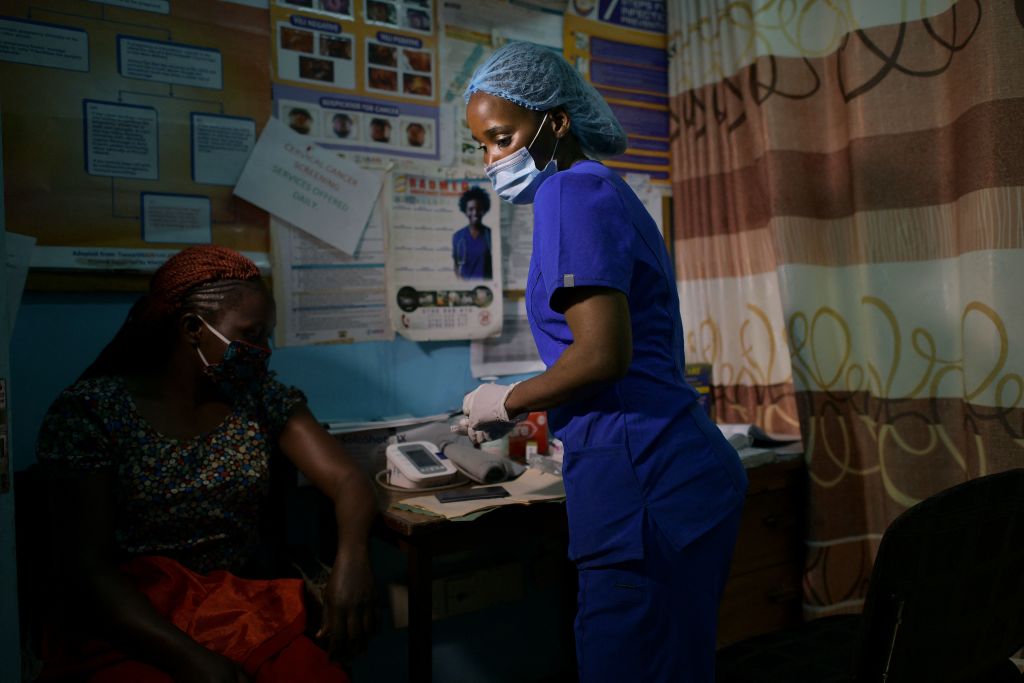When we spoke to Margaret Odera last year, she was walking home to home in her Nairobi neighborhood with paper and pen — part of a millions-strong global workforce of community health workers [CHWs] who perform crucial frontline health work, but are underpaid or even unpaid.
This month, she is leading the largest-ever CHW delegation of the Community Health Impact Coalition to the United Nations General Assembly, where she will be joined by colleagues from countries including Zambia, Sierra Leone, and the United States. These workers, who are mostly women, form the backbone of public health interventions across the globe, crucial community health canvassing and rapid response, addressing everything from cancer referrals to HIV treatment and vaccinations.
Rarely having a formal seat at the table before, their goal is to disrupt business-as-usual for an aid community that preaches women’s empowerment but has looked the other way while CHWs like Odera, have been undervalued and exploited for decades. A 2022 report by Women in Global Health, a nonprofit that advocates for gender equity, claimed that 6 million female health workers are unpaid or underpaid, while a 2015 paper in Lancet estimated that unpaid work by CHWs contributed $1.4 trillion to the global economy.
We caught up with Odera as she prepared for her New York trip to learn about her UNGA plans as well as her community’s recent wins in Kenya. Our conversation has been edited for length and clarity.

What will be your main demand at the UN General Assembly?
We really need to get from discussions to action.
We have been [wanting] to see a salaried workforce. The World Health Organization is even writing articles that community health workers have to be paid professionally. Then why is it taking eternity to put it into action?
We have details of what we have been speaking about since last year. They have all that detail. So it’s high time now. It can be, it should be put into action.
Can you give an example of impact that wouldn’t happen without community health workers?
Right now we don’t have polio in Kenya because I go door to door saying, “polio, polio,” giving vaccines. When children see me wearing a yellow uniform, they know and they will start singing, “polio, polio!” because we do that vaccination immediately, even if it’s just a suspected case.
Let’s go to the households and see who those people know. They call me “doctor” because I attend to them, I mobilize, I teach them.
I understand that things are improving at least in Kenya?
Last year in October, the president signed a law that community health workers in Kenya should be recognized as part of the Ministry of Health. And that’s very, very important.
We are still having things put in place. But I believe that we are on our way to being employed, to being salaried. Right now we are being equipped. We have a new backpack that has a blood pressure machine, it has medicine — and this shows that we are on the right way. We can go anywhere and just test a child. We can go and test diabetes and refer [patients] in a very official way. We have uniforms.
We have never had something like a BP [blood pressure] machine. We were just going from house to house with a pen and a paper. Now we have been given smartphones.
We are recognized by the laws of Kenya. That means that when I get attacked out there, or when something happens, the Ministry of Health can stand for me and say, ‘this is one of us, and she did this because of that and that.’ That’s huge, just to have that built in in writing, you know. It is something very new.
These changes in Kenya have inspired the African Union to adopt similar policies — are you hopeful this will spread further?
I really appreciate the fact that right now we went from Kenya to all of Africa, and next from Africa to the whole world. When I look at the WhatsApp groups that we are having and I see countries like Madagascar, Haiti coming on board — I feel so encouraged that there is a community health worker from Kenya and a community health worker from the U.S. and from Spain connecting. It gives me an idea of having a global umbrella for community health workers, which is very, very important.
And being at UNGA, we are bringing community health workers from Kenya, Rwanda, Burundi, Haiti and Pakistan together and speaking in one voice.
That voice is advocacy, that language is advocacy. [In Kenya] each and every community health worker right now transmits data using their smartphone to an electronic community health information system — we went through that training courtesy of the Ministry of Health. There is a lot of improvement from 2022 up to now. The government is responding to advocacy.
It feels like a lot of labor just to get paid for the job you’re already doing.
When the global health powers ask at UNGA, where did we go wrong? Which loopholes do we have? The loopholes are right under our nose, but we can’t see it — it is us [CHWs].
All this is done because you want to have global, universal health coverage. If you leave community health workers behind, then you’re leaving everybody else behind.
Allan Olingo contributed to this reporting.
*This story has been corrected to more accurately reflect CHIC’s presence at the general assembly.



